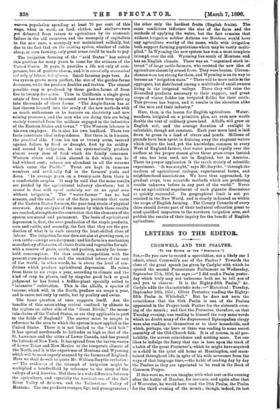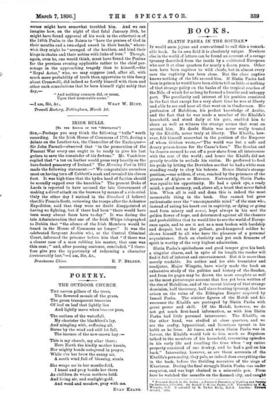LETTERS TO THE EDITOR.
CROMWELL AND THE PSALTER.
[To TIM EDITOR or TIM " SraorAlon."]
SIR,—Do you care to record a speculation, not a likely one I admit, about Cromwell's use of the Psalter P Towards the close of the great speech (as given by Carlyle) with which he opened the second Protectorate Parliament on Wednesday, September 17th, 1656, he says :—" I did read a Psalm yester- day which truly may not unbecome both me to tell you of and you to observe. It is the Eighty-fifth Psalm," azc.. Carlyle adds the characteristic note :—" Historical : Tuesday, September 16th, 1656 ; Oliver Protector reading the Eighty- fifth Psalm in Whitehall." But he does not note the coincidence that the 85th Psalm is one of the Psalms appointed in the Prayer-book Psalter for the sixteenth even- ing of the month ; and that the Protector, therefore, on that Tuesday evening, was reading to himself the very same words which no doubt many of the dispossessed Episcopalian clergy were also reading to themselves or to their households, and which, perhaps, one here or there was reading to some secret. assembly of the Old-Church folk. It is of course, in all pro- bability, the merest coincidence and nothing more. Yet one likes to indulge the fancy that one is here span the track of a habit of the great Protector's, which he might have acquired as a child in the quiet old home at Huntingdon, and main- tained throughout life, in spite of his wide severanee from the- ways of that long-ago time,—the habit of reading day by day- the Psalms as they are appointed to be read in the Book of Common Prayer.
If this were so, we can imagine with what zest on the evening after the battle of Dunbar, for instance, and again after that of Worcester, he would have read the 18th Psalm, the Psalm for the third evening of the month ; though, indeed, its last verses might have somewhat troubled him. And we can imagine how, on the night of that fatal January 30th, he might have found approval of his work in the exhortation of the 149th Psalm to the Saints to "have the praises of God in their months and a two-edged sword in their hands," where- with they might be "avenged of the heathen, and bind their kings in chains and their nobles with links of iron." Though, again, even he, one would think, must have found the Psalms for the previous evening applicable rather to the chief per- sonage in the approaching tragedy than to himself,—the "Royal Actor," who, we may suppose (and, after all, with much more probability of truth than appertains to this fancy about Cromwell), did indeed so fortify himself with them and etther such consolations that he bore himself right nobly that day,— " And nothing common did, or mean, Upon that memorable scene."







































 Previous page
Previous page